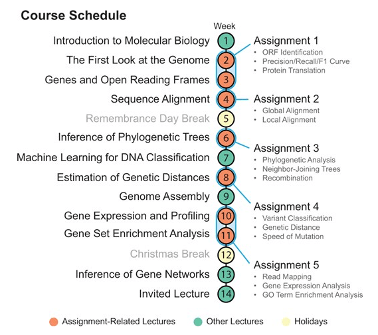The smart Trick of Bioinformatics Tutor That Nobody is Discussing
The smart Trick of Bioinformatics Tutor That Nobody is Discussing
Blog Article
The Of Bioinformatics Tutor
Table of ContentsHow Bioinformatics Tutor can Save You Time, Stress, and Money.How Bioinformatics Tutor can Save You Time, Stress, and Money.The 8-Minute Rule for Bioinformatics TutorBioinformatics Tutor - An OverviewWhat Does Bioinformatics Tutor Do?
Of the overall individuals involved in the training, 80% were trainees from public college establishments, while the continuing to be 20% originated from exclusive organizations. To get approved for a certificate of involvement, pupils were required to participate in at the very least 90% of the complete training hours. As an outcome of this requirement, a remarkable 95% of the individuals successfully gotten their certificates, having not just met the minimum attendance criteria however additionally finished all designated tasks throughout the training.
Throughout the elevation of the COVID-19 pandemic, especially in between June and August 2020, the project team was charged with arranging specialized training in bioinformatics. This training was particularly targeted at pupils from the research team Core for Study in Applied Computing at the Federal University of Pará (UFRA) The adjustment to remote knowing systems due to the pandemic developed a possibility to discover new teaching methods and digital tools that enhanced both reach and performance.
To react to the growing need in the computing and life sciences areas, a sophisticated program was presented in 2020 labelled Intro to Machine Learning. This program was developed to offer an accessible yet detailed summary of Artificial Knowledge techniques, particularly as used in bioinformatics. The program was lugged out over 3 months, from October to December 2020, and was supplied entirely online with the Google Meet platform. This virtual style enabled involvement from trainees throughout Brazil, several of whom may not have had the possibility to participate in in-person sessions.
Indicators on Bioinformatics Tutor You Should Know
Around 50% of the overall training hours were devoted to useful tasks where trainees constructed intelligent designs and applications in a variety of clinical domains, including genes, molecular biology, and environmental data evaluation. These systems enabled pupils to involve in real-time information adjustment, design training, and formula experimentation.
The training course attracted 80 individuals in total. Sixty of them were connected with numerous college organizations in the state of Pará, while the continuing to be twenty originated from establishments located in 5 other Brazilian states. This wide geographical representation highlighted the nationwide passion in bioinformatics and the expanding demand for specialized skills around. By presenting Artificial Knowledge in a practical and appropriate context, the effort offered to link the space between concept and real-world application, providing trainees with a solid structure for future study or employment in the area.
The training campaign created part of a more comprehensive academic outreach effort recognized as the Bioinformatics when traveling job. This task has, over the years, presented loads of trainees to the globe of bioinformatics and computational biology. The events held under this umbrella campaign have taken location throughout several regions and years, as summarized in Table 1 (Checklist of events, areas, years, and overall numbers of pupils and teachers)
Numerous of these groups, initially brought together by their involvement in training events, have actually considering that gone on to create independent scientific research in cooperation with regional scholastic establishments. The training not just promoted clinical thinking within the context of bioinformatics but likewise stimulated joint partnerships that expanded past the training setting.
Unknown Facts About Bioinformatics Tutor
The same group, omitting IH and RR, also acted as tutors for the useful training components. Funding for the task was supplied through the give 88887.200562/ 2018-00 from CAPES.
The Federal University of Pará's Workplace of Study (PROPESP/UFPA) also gave financial backing, specifically for the production of the last manuscript. The authors state no economic or commercial disputes of interest check over here that can have affected the research study. All interpretations and point of views expressed in this article are exclusively those of the authors and do not necessarily mirror those of their particular establishments, the author, editors, or customers entailed in the publication procedure.

Things about Bioinformatics Tutor
From a pedagogical viewpoint, the training technique made use of in the training was intentionally interactive. Classes were carried out in a way that urged student participation and discussion, going beyond memorizing memorization to explore exactly how ideas are developed, used in life, and examined in academic setups. The training ideology focused on nurturing both solid and battling trainees, supplying individualized assistance, and building confidence through continual mentorship and persistence.

Each team, containing around 36 individuals, was supported by 3 coaches-- most of whom were postdoctoral researchers with specific competence. These mentors not only helped design the team projects yet likewise promoted their implementation, ensuring that each research inquiry was both properly challenging and pertinent. The goal was to supply a naturally sensible context that participants might explore with open-ended objectives and accessibility to curated datasets.
For additional insights right into the methodology and end results of this project-based knowing method, visitors are directed to S1 Text, that includes in-depth summaries of the instructional structure, assessment approaches, and project styles utilized in the training sessions.
All About Bioinformatics Tutor
Of the total amount individuals involved in the training, 80% were trainees from public higher education organizations, while the staying 20% came from private institutions. To certify for a official source certificate of participation, pupils were required to attend at least 90% of the overall training hours. Notably, beyond the trainees who enlisted in the training sessions, 7 seasoned instructors got involved in delivering the programs, while 3 committed research study teachers collaborated the overall training process. Around 50% of the total training hours were dedicated to functional tasks where students built smart designs and applications in a range of scientific domains, including genetics, molecular biology, and ecological data evaluation. The training not just promoted scientific reasoning view it within the context of bioinformatics however likewise sparked joint relationships that expanded beyond the training atmosphere.
Report this page